#the greeks
Text
The Greeks by Roderick Beaton: A Review
To read or not to read?

Recently I mentioned I was reading a book that I intended to make a post about. I had also said how it was brilliant in the beginning but I was keeping my expectations low for the next chapters, which tackled periods of the Greek history many foreigners like to view controversially as an MO.
We have talked about Roderick Beaton before in the blog. An anon had asked me what I thought of the way he viewed Greek identity, here's a link to my answer.
Should one read his book "The Greeks; A Global History"? Sure. Preferably a beginner in the later stages of Greek history. The truth is that a Greek or anybody well-versed in Byzantine and Modern Greek history is going to find the book lacking in those areas. But here's what you can expect from this book.
The big deal about it is that it is the first or most notable English attempt to fit all of Greek history (starting from the Minoan and Mycenaean civilizations and ending with the Coronavirus) into about 500 pages. It is written in a very accessible manner and I would even say beautifully, except the beauty somehow progressively decreases a little, as if he was losing momentum chapter after chapter.
The curious thing is that Beaton is not another case of a classicist who worships Ancient Greeks and is grossed out by the existence of Modern Greeks. On the contrary, he is a unicorn, meaning a historian of Byzantine and Modern Greek history and he is not specialized in the ancient history which, for one, explains why he decided to follow a wholistic approach but on the other hand makes it odd that the early chapters are so much better than the later ones.
Now, a megamind here may say "well it's because ancient history is bEtTER dUh". No. This was not the root of the problem. I will explain but I have to describe first his mindset and intent for writing this book.
What I called "brilliant" about this book the other day and honestly the very highlight was, believe it or not, the prologue to the Greeks in the Greek edition. I am making this post because it single-handedly was the finest example of how a historian or any foreigner messing with other people's cultures and history should approach the descendants who have that heritage. There is a shitload of western Europeans and Americans who should be taking lessons from Beaton.
In the Greek edition, Beaton keeps the standard English prologue as well (so there are two prologues, one for all readers and the other for Greeks in specific) because he explains it is only fair that Greek readers should have an idea of how he introduces them to the rest of the world. I found this very considerate and thoughtful. It should be the obvious thing to do but we all know that too few (maybe only Beaton) have the quality of character it takes in order to think in this way.
The Greek prologue is in fact so good that I thought it should be included in the general English edition too because the way the author and historian addresses Greeks about his work and their history would be far more illuminating to other readers than some dry name- and event-dropping in the book's chapters.
In short, in the prologue he says that his intent is not that Greeks should be convinced that they need to read his book or adopt his perspective, he pays tribute to the Greek historians who attempted a similar wholistic approach but their works never became famous due to the language barrier and the prejudice of the west against Modern Greeks, which he confirms that it often reaches "vulgar extremes" and he exposes that very few historians in the west know or study the historical events and concepts of the Greek history that have given Modern Greeks a footing to claim historical continuity. Finally, he warns Greeks of how little of this is understood at all outside Greece and thus ultimately his intent is to present Greek history in a way that explains why the Greek civilization is so discussed, how it has influenced the world and simultaneously to suspend the knee-jerk reaction of scepticism the foreigners have by narrating the story in a low-profile, scientific and neutral way.
That prologue was a 100/5. His approach was totally fine with me. Besides, I too wanted an objective narration. His strategy was to narrate Greek history based on the history of the usage of the Greek language, which for me was the absolute obvious way to go about it and I found it odd that he sort of felt like explaining himself and that a few (only a few, I stress this) Greek readers took some mild issue with it. To me, it is obvious that the language is one of the biggest elements of ethnic heritage, let alone that for the Greeks it is the absolute hugest one since the borders of their existence and their influence have changed so much throughout the millenias. What will bring people that have been through four empires and hundreds other smaller political entities more together than the common language?! Nowadays, there is no ethnic group that speaks Greek as a mother tongue besides the Greeks. Therefore, the language is the ultimate factor for the Greek ethnic identity and I am baffled why this is viewed as a "novel approach". What else could it be in its stead? (Obviously, this doesn't mean that one cannot be Greek because they are 3rd gen Greek expat and do not know the language, I am just saying that it is typically the main factor, not the unique one.)
THE PROS
Apart from the prologue, Beaton tries, not very successfully (but it's the effort that matters), to dedicate roughly the same number of pages to all stages of Greek history. Most chapters are about 30 pages long, give or take, although the "give" ones are more frequent in the beginning and the "take" in the end.
Most importantly, he does not say anything critically different from whatever you will read in a Greek telling of history. Even though he sounds neutral, often critical and unimpressed, he almost never defies the Greek perspective of things. He certainly lacks one certain enthusiasm that in a Greek ethnic narrative would maybe cause scepticism to foreign readers but he never deviates from the very substance of what Greeks claim, therefore giving a somewhat cold, scientific affirmative nod to them. As an example, he treats the Ancient Macedonian royalty as evidently Greek and the Macedonian peasants as "para-Greeks" or fast hellenizing peoples and specifies that they spoke Greek dialects at least four centuries before Alexander. He talks about two types of Greek receptions towards Macedonians, the very opposing ones like that of Demosthenes and the very loving ones like that of Isocrates. That was a nice point to deepen in the reasons and motives behind each one's stance but he fails to go deeper. Regarding the name issue nowadays, he compares sarcastically the hatred Demosthenes had with the modern patriotism regarding the "Greekness" of Macedonia, however also clarifies how Slavic populations reached the area almost a millenium later so that any claim made to Macedonian heritage by them is absurd. Then, he is clear from the beginning of the medieval narrative that while Greeks called themselves Romans, the Eastern Roman was a new Greek culture with which Greeks reinvented themselves and it was ultimately not a real Roman empire. He calls it "Byzantine" to distinguish it and then he also occasionally calls Byzantines "Romans", always with those quote marks of disbelief. Despite sounding very distanced half of the time, he simultaneously gives various examples of Greeks identifying as Greeks (Hellenes) in various places in the world, from the mid era of the Byzantine empire up to the Ottoman era. Therefore, he largely agrees with the Greek perspective in those things, despite keeping a "scientific distance". All of his claims, evey single statement is always sourced in this book.
Some Greek readers complained that he speaks about Hellenized Greek speakers more than for Greeks. I personally consider this totally valid and expected from a study in the Greek - often imperial and often linked to liguistics - history. But it's not accurate that he talks more about Hellenized foreigners, he still talks about Greeks more.
He obviously treats Ancient, Koine and Modern Greek as one language, he doesn't even bargain on that and he seems to be equally fascinated by both ancient and modern forms of it. After all, it's the language he defines as the very essence of Greek identity.
MIXED / CONS
The images used were okay but surely there are better ones available.
I think my biggest issue with the book is that although I understood his approach thanks to the prologue, I still think that he failed a little in its execution. He just seems to be fascinated by some points in Greek history that do not agree at all with the points that I find most fascinating. This could be subjective or it could be that I view Greek history from an ethnic perspective like he said and he from a global perspective, however I felt very validated when a foreign reader in some reviews expressed his disappointment at the extremely rushed, totally cold presentation of the Greek Revolution, because this was the part he wished to learn about. Beaton makes it clear again and again that what interests and fascinates him the most is the ability Greeks had to spread and prosper in empires or other places in the world by accidentally or consciously spreading their culture. Based on this mindset, his disappointment that they were independent yet isolated in their own state compared to being influential despite unfree in the Ottoman empire is somewhat loud. He literally sounds more impressed by a Greek opening a shop in London in the 16th century than by the brutal, desparate battles of the Independence War or WWII, which he doesn't even mention except just the wars overall in passing. That was wild. And I am glad foreign readers were equally baffled. Beaton took so earnestly his intent to find points of convergence between the Greeks and the west or globalism that he ignores major events simply because they were affecting Greeks as an ethnos more. But it's questionable critical thinking in the end. The Greek revolution and the Greek contribution against the Axis powers, for example, did affect the rest of the world much more than a shop or two Greek generals in a French-British battle. He gives several interesting anecdotes but it's a really uneven and peculiar management of the events. Again, he's not being inaccurate (except in a couple of cases), he's just dedicating page space to the oddest of things.
Although he did his best to roughly dedicate equal number of pages to general big eras of Greek history, each of the chapters have an odd pattern of how they are managing their 30 pages. No matter what mindset he followed, there is not any logical way to explain how Greece since 1974 (where nothing big happens apart from the crisis) gets 30 pages when the Independence War gets... five. Five extremely lukewarm ones, where of all of the dozens of historical figures he could talk about, he talks only about three, the one solely because he was a pro-British politician and two other generally acknowledged as the most significant but famously anti-British, so they totally get the short end of his sympathy. There is where I also find the most unacceptable inaccuracy, when he says the "decent" (AKA the best) governor Kapodistrias was assassinated by two political adversaries. Now, that's just false. He was not killed by political adversaries. And he totally "forgets" to mention that both France and the UK have been accused of '''"indulging"''' his assassination. It became worse when I saw that even though he used international sources from historians and scientists for the rest of the book, he used.... the BRITISH AMBASSADOR for the Modern Greece chapters. Like wow. Not Greek but British input. And even if the ambassador is a historian himself, it still doesn't change that above all he is a politician serving his country's interests. Beaton does admit in a few instances faulty deeds from the west or the UK but it is always half-hearted.
Half-hearted are also all the references to the wrongdoings other nations have done to Greeks. In general, other nations are treated very indifferently while Greeks receive both all his fascination but also all his criticism. This makes some sense - it's a book about Greeks after all. But it gets a little odd at times again, like, there is a sentence almost going "thousands of Greeks were slaughtered, anyway" *changes subject* I mean, when you write a book only about the Greeks, I think the readers will allow you some empathy towards them without thinking you are biased from the get go. You can feel for them in other ways that don't always have to do with their "genious adaptability". In the end, despite the 500 pages dedicated to them I think there is too little to be learned about who the Greeks truly are as people (besides super skilled chameleons), their profile, their lifestyle, what makes them ick or smile. It does lack a human approach. And I honestly believe Beaton severely underestimated that foreign readers would in fact be interested in this; decoding their human side.
The other thing I found odd is that he stresses Homer never calls all of Greeks as Hellenes. This is false, right? I was pretty sure he calls all Greeks Hellenes a couple of times and there is even an instance of "Panhellenes" (= all Hellenes). Of course, it's much rarer than the use of Achaeans but it exists. I read the Iliad recently. Am I losing it here?
Much like it happens with the culture and the people, Beaton seems to love the Greek language as well. I read he has some specialty in linguistics. Since it is the foundation of his approach, I wished he had attempted to explain to readers who have zero exposure to Greek, what he finds fascinating in it and how he explains the tremendous grip this language historically had to others and how he justifies his conviction that even now Greek has the potential to keep influencing people in the future. I would appreciate a chapter solely about a linguistic analysis. Because this is what he seems to unequivocally love the most, so again it is like he was too afraid to be too emotional. I am not saying he should be sentimental to the point of being inaccurate, not at all. I welcomed the criticism, especially about the trademark Greek political stupidity throughout millenias. But I think he failed a little to make readers connect with Greeks in the way he so wanted.
THE TAKEAWAY
With all its flaws, it's probably still the best if not the only Western wholistic approach to Greek history. Despite the few hiccups here and there, the book is mostly very well sourced out and contains quite a few little known interesting facts. It is beautifully written. The Byzantine and especially the Modern chapters are underwhelming, however it is your best chance to make a first dive in the whole of the Greek civilization in one single book. I'd say, read it and if there is anything you found intriguing in those chapters, you can search more sources, even from a Greek perspective (as Beaton and his sources confirm that a sober Greek perspective doesn't deviate much from the neutral truth) and I guarantee you it will only get more interesting from there.
Rate: an overall 3.75 / 5, with its highlights deserving a 5 and its lowest moments deserving a 2.5.
*I just saw he also wrote a separate book specifically about Modern Greece. I am interested to see how his approach differs or is maintained there.
#greece#history#reading#the greeks#books#book rec#review#recommendation#roderick beaton#greeks#greek history#opinion
17 notes
·
View notes
Text
Hades and Persephone
Disclaimer: this rant is not about fanfic - fandom is a free space and what the next person does is none of my business.
This is more YA and how certain works may influence and harm young, impressionable readers.
It's also about misogyny in shallow "feminist" retellings
I have work to do so of course I'm going to procrastinate in a very random way: Hating on the modernised, girlboss but actually misogynist version of the myth and turning the camera back to who the story is actually about: the bereaved milf Demeter.
Obviously, as a whole the Greek gods are not meant to be pillars of modern or even ancient moral values. And there's nothing wrong with imagining Hades as more than creepy uncle.
But reimagining this exact myth in a way that demonises the loving and concerned mother Demeter is misogynistic.
Won't get into how reimagining it as Persephone being not just wiling but the mastermind puts the "blame" of kidnapping and sa on the little girl and sounds eerily similar to how predators speak
The Hymn is a song of praise for Demeter, the story is not "told from her perspective" the story is about her.
And I often think it's done by people who are mostly unaware of any real knowledge of the myth outside of pop culture. That's not a dig, not everyone has the time, resources or even the want to read up on it.
But, maybe, if you're gonna write about something - even if you don't plan to stick to the original - a little research would help.
So here's most of the original story
(Translation by H.G. Evelyn-White)
The Homeric Hymn to Demeter
[Hades kidnaps Persephone while she in a field of flowers]
He caught her up reluctant on his golden car and bare her away lamenting. Then she cried out shrilly with her voice, calling upon her father, (...)
[Persephone screams for help so loudly her voice carries over the Earth and reaches even Olympus but her father (Zeus) doesn't help because he agreed to it already]
So [Hades], that son of Cronos, of many names, who is Ruler of Many and Host of Many, was bearing her away by leave of Zeus on his immortal chariot – his own brother’s child and all unwilling.
[In her 'final' moments, Persephone takes in the Earth - her natural domain - and yearns for it, her mother and Olympus]
And so long as [Persephone], the goddess, yet beheld earth and starry heaven and the strong flowing sea where fishes shoal, and the rays of the sun, and still hoped to see her dear mother and the tribes of the eternal gods, so long hope calmed her great heart for all her trouble...
[Demeter hears Persephone screaming, rushes to her and looks for her - completely distraught and wrecked by grief]
Bitter pain seized her heart, and she rent the covering upon her divine hair with her dear hands: her dark cloak she cast down from both her shoulders and sped, like a wild-bird, over the firm land and yielding sea, seeking her child.
But no one would tell her the truth, neither god nor mortal man; and of the birds of omen none came with true news for her. Then for nine days queenly Deo wandered over the earth with flaming torches in her hands, so grieved that she never tasted ambrosia and the sweet draught of nectar, nor sprinkled her body with water
[On the 10th day Hecate takes Demeter to Helios, who witnessed the kidnapping, and Demeter pleads to him:]
"(...) Through the fruitless air I heard the thrilling cry of my daughter whom I bare, sweet scion of my body and lovely in form, as of one seized violently; though with my eyes I saw nothing. But you – for with your beams you look down from the bright upper air over all the earth and sea – tell me truly of my dear child, if you have seen her anywhere, what god or mortal man has violently seized her against her will and mine, and so made off .”
[Helios ultimately tries to comfort her saying Hades isn't a bad match in status but before that says:]
And the Son of Hyperion answered her: “Queen Demeter, daughter of rich-haired Rhea, I will tell you the truth; for I greatly reverence and pity you in your grief for your trim-ankled daughter. None other of the deathless gods is to blame, but only cloud-gathering Zeus who gave her to Hades, her father’s brother, to be called his buxom wife. And Hades seized her and took her loudly crying in his chariot down to his realm of mist and gloom.
[Demeter is further saddened and enraged by the added betrayal]
But grief yet more terrible and savage came into the heart of Demeter, and thereafter she was so angered with the dark-clouded Son of Cronos that she avoided the gathering of the gods and high Olympos.
[Demeter disguises herself as a mortal and takes on the form of a weathered, 'elderly' (more likely middle aged) woman. She then goes to the city of Eleusis.]
Vexed in her dear heart, she sat near the wayside by the Maiden Well, from which the women of the place were used to draw water, in a shady place over which grew an olive shrub. And she was like an ancient woman who is cut off from childbearing and the gifts of garland loving Aphrodite, like the nurses of kings’ children who deal justice, or like the housekeepers in their echoing halls.
She meets 4 daughters of King Celeus (Callithoe, Demo, Callidice and Cleisidice) who are probably around the same age as Persephone and described as "like goddesses in the flower of their girlhood".
The girls don't know her - not just as the goddess but as a person - but nonetheless they worry about her and tell her to come into the town to be with other women, older and younger, who would "welcome [her] by both by word and by deed."
Demeter tells them her name is Doso, from Crete, and that she was captured by pirates and brought over but managed to escape. She asks the girls if there's any work in the household for a woman her age - including housekeeping, teaching younger women or nursing and rearing a newborn child.
[Callidice tells 'Doso' about good households that might be in need of help but says that in their own house, their 'elderly' mother - Metaneira - has just had a son]
She has an only son, late-born, who is being nursed in our well-built house, a child of many prayers and welcome: if you could bring him up until he reached the full measure of youth, any one of womankind who should see you would straightway envy you, such gifts would our mother give for his upbringing.”
[Demeter arrives at the house and Metaneira, who feels her prescence right away, gives up her chair despite being a nursing mother with her baby in her hands and the wife of the king.]
But the goddess walked to the threshold: and her head reached the roof and she filled the doorway with a heavenly radiance. Then awe and reverence and pale fear took hold of Metaneira, and she rose up from her couch before Demeter, and bade her be seated.
But Demeter, bringer of seasons and giver of perfect gifts, would not sit upon the bright couch, but stayed silent with lovely eyes cast down until careful Iambe placed a jointed seat for her and threw over it a silvery fleece. Then she sat down and held her veil in her hands before her face.
A long time she sat upon the stool without speaking because of her sorrow, and greeted no one by word or by sign, but rested, never smiling, and tasting neither food nor drink, because she pined with longing for her deep-bosomed daughter, until careful Iambe – who pleased her moods in aftertime also – moved the holy lady with many a quip and jest to smile and laugh and cheer her heart.
*[Iambe is the slave of king Celeus but also daughter of the god, Pan and the nymph, Echo. She is the only one who made Demeter feel better.]
[Demeter accepts the offer to nurse and raise the Queen's son, Demophoon, and promises to protect him. However, still unaware that Doso is the goddess, Demeter, Metaneira is distraught when she finds out how Doso holds the baby (above or in) fire every night]
And the child grew like some immortal being, not fed with food nor nourished at the breast: for by day rich-crowned Demeter would anoint him with ambrosia as if he were the offspring of a god and breathe sweetly upon him as she held him in her bosom.
But at night she would hide him like a brand in the heart of the fi re, unknown to his dear parents. And it wrought great wonder in these that he grew beyond his age; for he was like the gods face to face.
And she would have made him deathless and unageing, had not well-girded Metaneira in her heedlessness kept watch by night from her sweet-smelling chamber and spied.
But she wailed and smote her two hips, because she feared for her son and was greatly distraught in her heart; so she lamented and uttered winged words: “Demophoon, my son, the strange woman buries you deep in fire and works grief and bitter sorrow for me.”
[Demeter literally drops/throws the baby (he's fine) and yells at Metaneira, the forces the town to become the site of the annual Eleusinian Mysteries which were performed in worship of Demeter and Persephone]
“Witless are you mortals and dull to foresee your lot, whether of good or evil, that comes upon you. For now in your heedlessness you have wrought folly past healing; for – be witness the oath of the gods, the relentless water of Styx – I would have made your dear son deathless and unaging all his days and would have bestowed on him everlasting honor, but now he can in no way escape death and the fates.
Yet shall unfailing honor always rest upon him, because he lay upon my knees and slept in my arms.
But, as the years move round and when he is in his prime, the sons of the Eleusinians shall ever wage war and dread strife with one another continually. Lo! I am that Demeter who has share of honor and is the greatest help and cause of joy to the undying gods and mortal men.
But now, let all the people build me a great temple and an altar below it and beneath the city and its sheer wall upon a rising hillock above Callichorus. And I myself will teach my rites, that hereafter you may reverently perform them and so win the favour of my heart.”
[Demeter throws off her disguise and leaves]
When she had so said, the goddess changed her stature and her looks, thrusting old age away from her: beauty spread round about her and a lovely fragrance was wafted from her sweet-smelling robes, and from the divine body of the goddess a light shone afar, while golden tresses spread down over her shoulders, so that the strong house was filled with brightness as with lightning. And so she went out from the palace.
Demeter is a MILF, a hottie, stop portraying her otherwise
[The temple is built but it doesn't cure Demeter of her sorrow and her depression causes a year without crops of harvest]
But golden-haired Demeter sat there apart from all the blessed gods and stayed, wasting with yearning for her deep-bosomed daughter.
(...)
So she would have destroyed the whole race of man with cruel famine and have robbed them who dwell on Olympos of their glorious right of gifts and sacrifices, had not Zeus perceived and marked this in his heart.
First he sent golden-winged Iris to call rich-haired Demeter, lovely in form. So he commanded. And she obeyed the dark-clouded Son of Cronos, and sped with swift feet across the space between.
She came to the stronghold of fragrant Eleusis, and there finding dark-cloaked Demeter in her temple, spake to her and uttered winged words: “Demeter, father Zeus, whose wisdom is everlasting, calls you to come join the tribes of the eternal gods: come therefore, and let not the message I bring from Zeus pass unobeyed.” Thus said Iris imploring her.
But Demeter’s heart was not moved.
Then again the father sent forth all the blessed and eternal gods besides: and they came, one after the other, and kept calling her and offering many very beautiful gifts and whatever rights she might be pleased to choose among the deathless gods.
Yet no one was able to persuade her mind and will, so wroth was she in her heart; but she stubbornly rejected all their words: for she vowed that she would never set foot on fragrant Olympos nor let fruit spring out of the ground, until she beheld with her eyes her own fair-faced daughter.
[Zeus sends Hermes to persuade Hades to let Persephone out to see her mother so Demeter will calm down, Hades basically has no choice and agrees but...]
And [Hermes] found the lord Hades in his house seated upon a couch, and his shy mate with him, much reluctant, because she yearned for her mother. But she was afar off, brooding on her fell design because of the deeds of the blessed gods.
And Aidoneus, ruler over the dead, smiled grimly and obeyed the behest of Zeus the king. For he straightway urged wise Persephone, saying: “Go now, Persephone, to your dark-robed mother, go, and feel kindly in your heart towards me: be not so exceedingly cast down; for I shall be no unfitting husband for you among the deathless gods, that am own brother to father Zeus. And while you are here, you shall rule all that lives and moves and shall have the greatest rights among the deathless gods: those who defraud you and do not appease your power with offerings, reverently performing rites and paying fit gifts, shall be punished for evermore.”
When he said this, wise Persephone was filled with joy and hastily sprang up for gladness. But he on his part secretly gave her sweet pomegranate seed to eat, taking care for himself that she might not remain continually with grave, dark-robed Demeter.
[Hermes and Persephone go to Demeter]
And when Demeter saw them, she rushed forth as does a Maenad down some thick-wooded mountain, while Persephone on the other side, when she saw her mother’s sweet eyes, left the chariot and horses, and leaped down to run to her, and falling upon her neck, embraced her.
But while Demeter was still holding her dear child in her arms, her heart suddenly misgave her for some snare, so that she feared greatly and ceased fondling her daughter and asked of her at once: “My child, tell me, surely you have not tasted any food while you were below? Speak out and hide nothing, but let us both know.
For if you have not, you shall come back from loathly Hades and live with me and your father, the dark-clouded Son of Cronos and be honored by all the deathless gods; but if you have tasted food, you must go back again beneath the secret places of the earth, there to dwell a third part of the seasons every year: yet for the two parts you shall be with me and the other deathless gods.
But when the earth shall bloom with the fragrant flowers of spring in every kind, then from the realm of darkness and gloom thou shalt come up once more to be a wonder for gods and mortal men. And now tell me how he rapt you away to the realm of darkness and gloom, and by what trick did the strong Host of Many beguile you?”
Persephone then tells her mother "(...) he secretly put in my mouth sweet food, a pomegranate seed, and forced me to taste against my will." and recounts her kidnapping "(...) in his golden chariot he bore me away, all unwilling, beneath the earth: then I cried with a shrill cry. All this is true, sore though it grieves me to tell the tale.”
Still they're happy to be reunited
So did they then, with hearts at one, greatly cheer each the other’s soul and spirit with many an embrace: their hearts had relief from their griefs while each took and gave back joyousness.
[Zeus calls on Demeter and promises her, Persephone will stay with her for 2/3rds of the year and in Hades 1/3rd. Rhea, their mother also comforts Demeter and urges her to accept the peace offering and she does. She then goes to teach certain Kings and cities the Mysteries.]
The End.
anyways >>>>>>> over the same old child bride mary sue Persephone falling in love with old emo Hades who empowers her.
Like all myths there are other versions, I'm sure, but the version of Persephone said to be a frightening Queen of the Underworld actually predate Hades so how about adapting and writing that instead of some creep edge lord and his child bride flower crown princess
46 notes
·
View notes
Text
"They were both geniuses; and it is notorious that geniuses accord with one another as harmoniously as dynamite with fire."
- Will Durant, The Story of Philosophy
Commenting on the friendship between Aristotle and Alexander (the great)
#philosophy#genius#will durant#history#quotes#aristotle#alexander the great#the greeks#ancient history#philosophical quotes#friendship#relationships#genius friendships
5 notes
·
View notes
Text
"... in a single day and night of misfortune, the island of Atlantis disappeared into the depths of the sea."
- Plato, 360 B.C.
6 notes
·
View notes
Text

Oh broseph, lemme tell you about the Ancient Greeks and this one dude, Dionysus
#Dionysus#the Greeks#bacchanalian#bacchanalia#Roman#Dionysian#beauty and the beast#is just Dionysus maybe??#sure why not
6 notes
·
View notes
Text
me: it’s just gonna be a short one act adaptation of book one of the iliad! nothing crazy!
also me: reads a 127 page journal as research, comes up with multiple original characters, arcs and original plot lines for each, changes a major plot point
#it’s for the female agency#the iliad#the classics#ancient mediterranean#homer#the greeks#briseis and chryseis deserve better ok i’m giving them their best lives
2 notes
·
View notes
Text
Does anyone have any articles about indigenous Sicilian Mythology they can recommend? Because I’m tired of trying to find anything on Sicilian Myths and finding everything Greek. I want to know about my ancestors from before the Greeks.
I can’t escape the feeling that Sicilians have never really belonged to themselves. We were Greek and Phoenician and Roman and Carthaginian and Mycenaean and All other things, not necessarily in that order.
I don’t know what to say. I don’t mean to be a downer, but we never belonged to ourselves. Being under the control of the Italians is just the latest in a long run of conquerors and colonists. They call and treat us the way the English treat the Welsh.
Im just really ———— upset and I want to learn more about my heritage from before the Greeks, from before anyone took over us. If anyone has anything or can recommend anything, lemme know by reblogs.
#sicilian#sad#A Sicilian version of Hiraeth would be great right now#sicilian ancestry#sicilia#the Greeks#the Italians#not really a rant but sort of#Phoenician#Romans#Romans enslaved us and brought slaves to Sicily#the Carthaginians#The Sikeloi and Sicani and the Elymians traded with the Mycenaeans#and the Minoans#and the Phoenicians#and the Greeks#before the Greeks took over the Eastern part of the island#and founded cities like Syracuse#the oldest city is#Messina#(on the island)#and I think it was Phoenician#Or Greek#we weren’t given time to develop as a society#before the island was taken over#I feel really sad and sort of sick#I’m sick of Northern Italians saying things like#‘Sicilians are criminals’ ‘Sicilians are lazy’ ‘Sicilians are dirty’ and then Sicilians go and say that and believe in and internalize it#this feels awful and I can’t talk about this in English without it becoming about babbi Miricani identity politics#please help
2 notes
·
View notes
Text
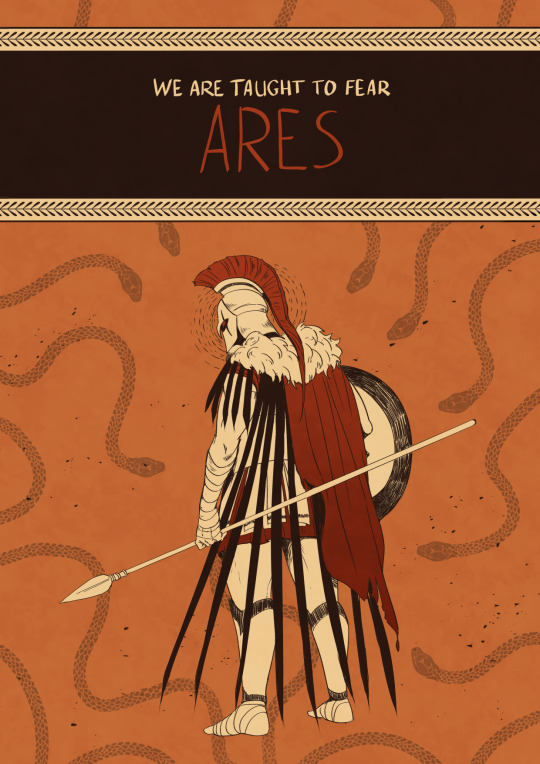
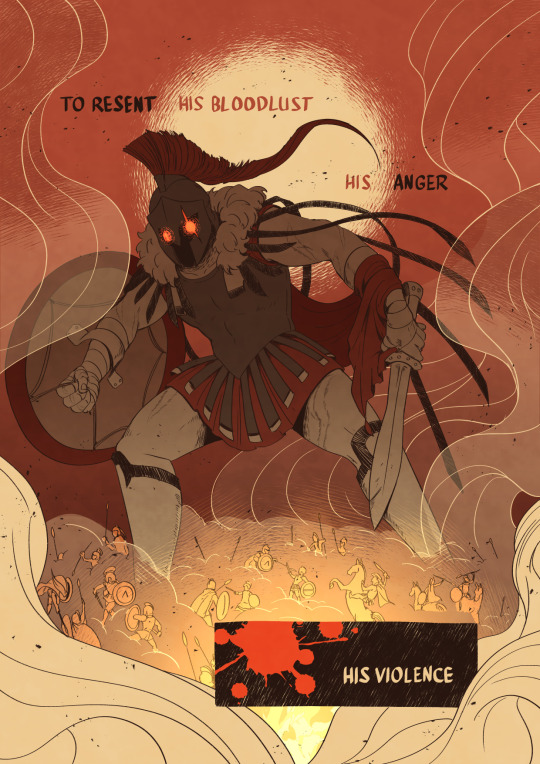
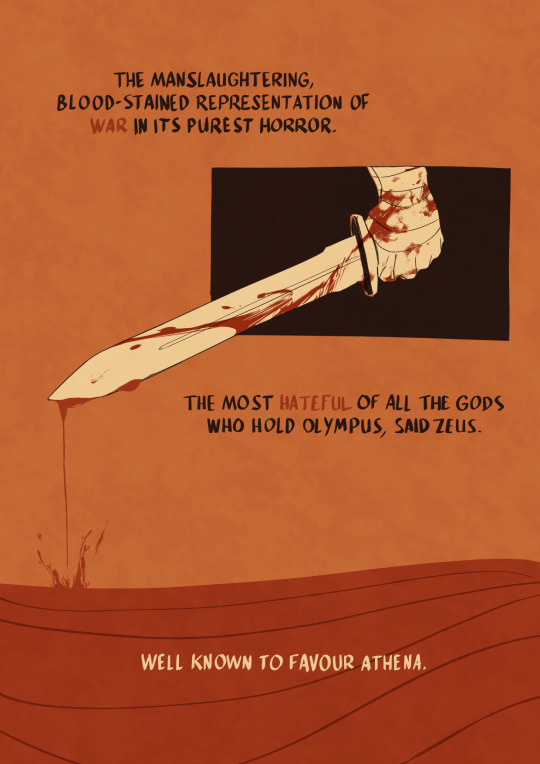
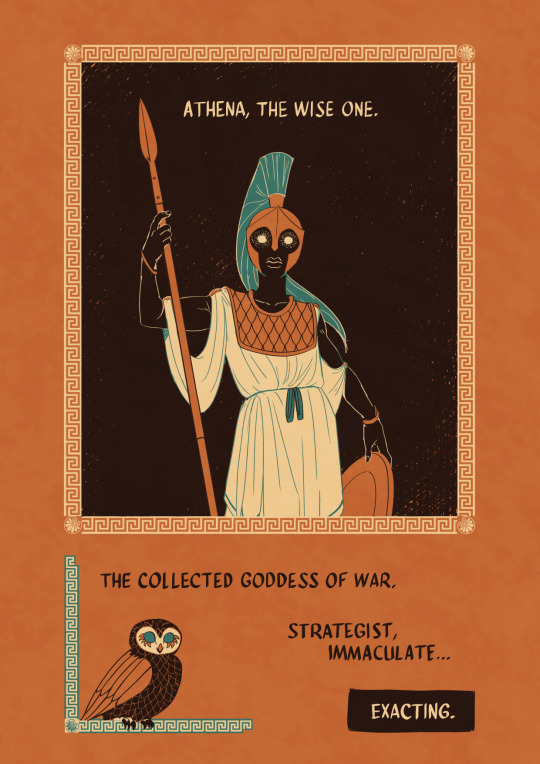
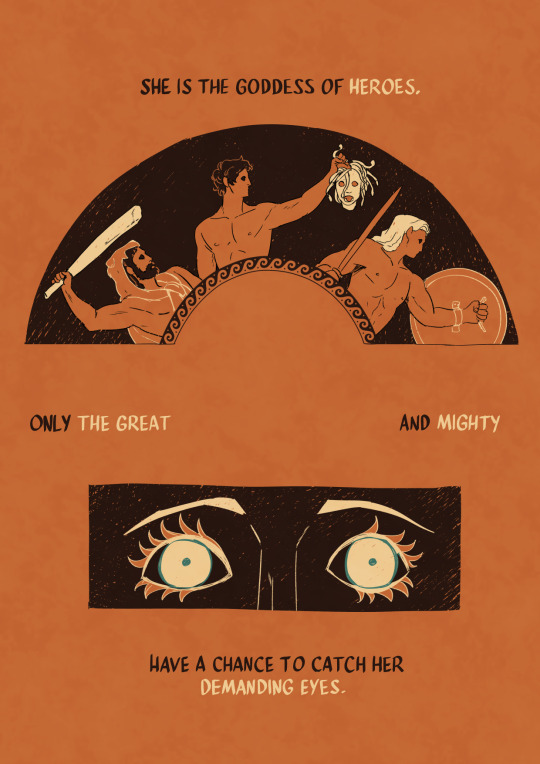
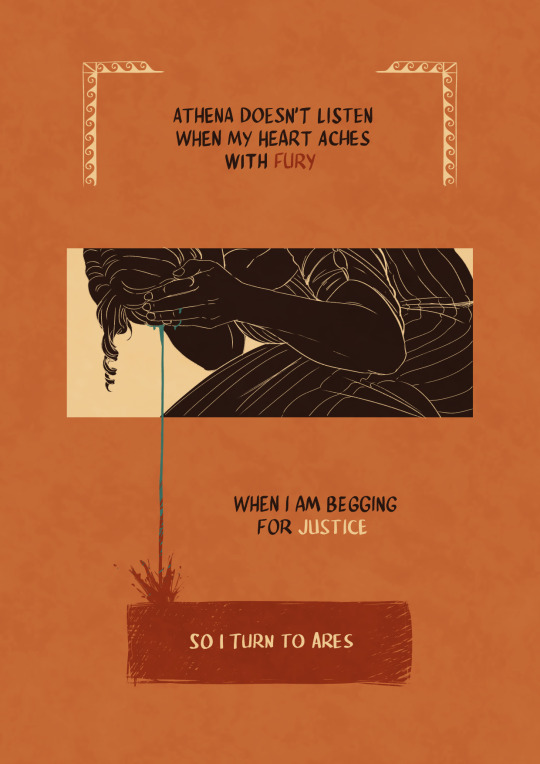
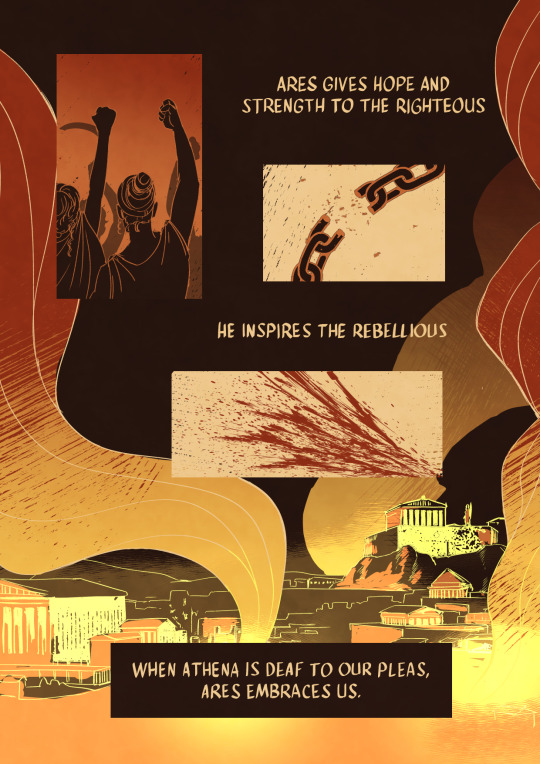
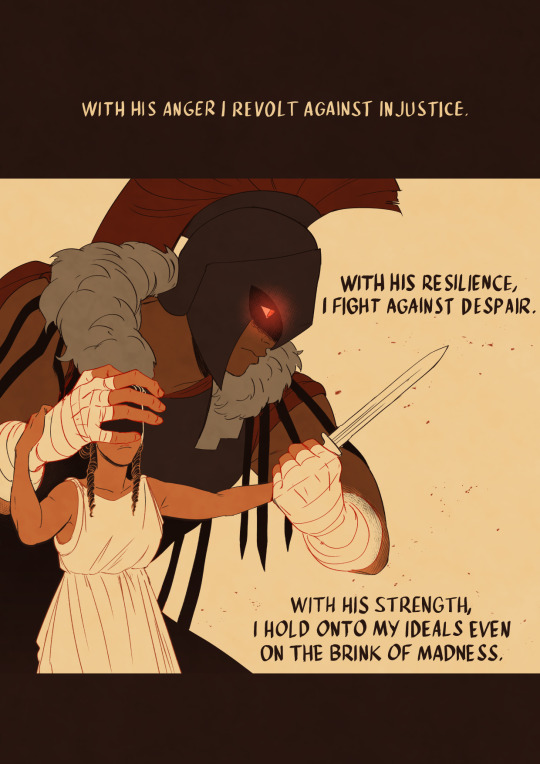
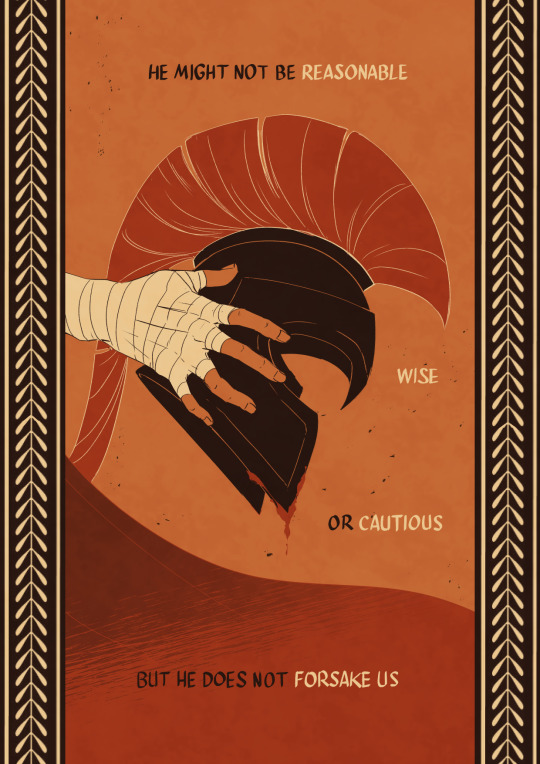
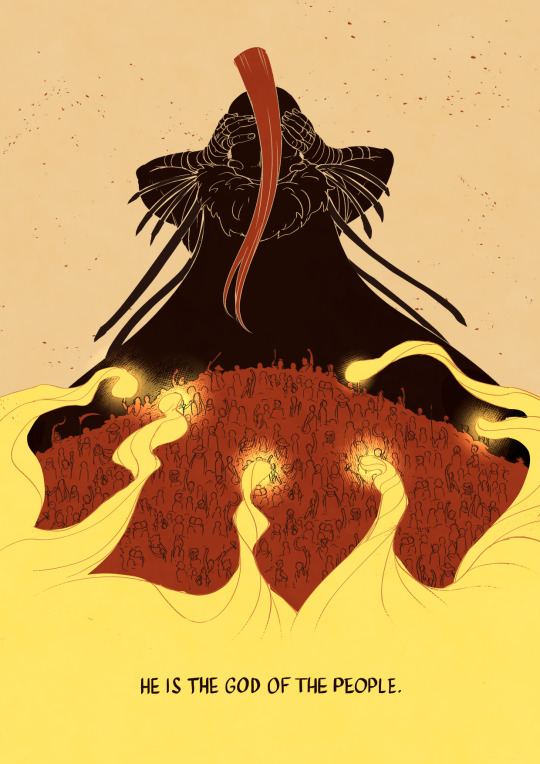
I turn to Ares.
Thanks to Tyler Miles Lockett who allowed me to draw inspiration from his ARES piece for page 2! Look at his etsy page it's SICK
⚔️ If you want to read some queer retelling of arturian legends have a look at my webtoon
#greek mythology#ares#athena#greek gods#dont get me wrong it aint athena slander but it sure is ares praise#on some level at least#man justly accused of bad things deserves some mid praise more at 11#thank you romi for helping me with words though i duly noted you insisted on ares not being cautious rather than him not being careful#romi be like “i want him to care” and honestly good you should say it#also EPIC led to this and i just..... i want to draw some animatics man i just need infinite time now#my long lost love for greek myths just will never stop coming and they dont stop coming and they dont stop coming#i want some vulture design in here for ares but not sure about this one#kochei doodles
64K notes
·
View notes
Text
If my mom sees a significant amount of blood she gets lightheaded, and has fainted on some occasions. Once it happened when we were kids, I wasn't there to witness it but I heard the story from my dad. Basically my brothers, around 7 or 8 at the time, were playing outside while my mom was making their lunch, and she accidentally cut her finger. It wasn't anything serious, but it drew a fair bit of blood and she passed out. My dad saw this and rushed over, but he didn't really know what to do so he just sort of started slapping her to wake her up (not recommended, but he had no idea and panicked)
At that exact moment my brothers both came in from playing, and all they saw was our mom unconscious on the floor and our dad slapping her. So, like, without even saying a word to each other they both just INSTANTLY start whaling on him, like, full blown attack mode to defend our mom. Which obviously didn't help the situation, but she did wake up and everything was fine.
Now our dad says that he's actually really glad they attacked him over what they thought was going on, because it means he raised good boys. And I still think that's true, they're very good boys.
#i think about this story sometimes like yeah I'm proud of them for that too actually. good job baby brothers#they're not babies anymore of course they're turning 20 next year which is crazy#but they're still the type of people who'd do something if they saw something of this sort happen for sure#respectful of women and everyone else too. they're good guys#I'm glad I ended up with them living in my house against my will for like 14 years#anyway i have no idea where i was for all this but my best guess is probably a friends house given the time period#i was always at my besties house lol#i hope she's doing well too actually. haven't spoken in forever...#bestie from greek elementary school... if you're out there... let's get muffins and fanta at the bakery across the street again someday 💜☮️
59K notes
·
View notes
Text
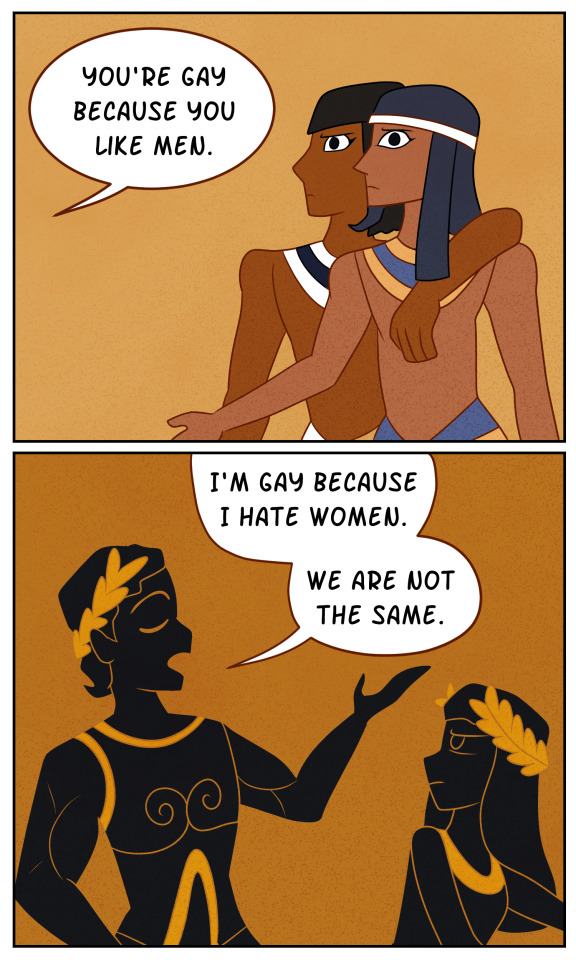
This seems to be what I've learned.
180K notes
·
View notes
Text
i wish there wasn’t such a stigmatized view on platonically loving people.
I can’t call people nicknames and pet names like hun and honey without them immediately assuming i have romantic interest in them.
i can’t tell my friends i love them without adding on “platonically” or shortening the phrase “ily” “love you” “love u”
i love a lot of people. i love my sister, i love my boyfriend, and i love my best friend. All different versions of love.
let us love people openly and honestly without it being seen as “making a move” or being romantically interested.
please please please stop assuming that love is strictly romantic, i promise you life becomes so much brighter and bigger when you stop keeping love strictly romantic.
#finn rants#platonic love#romantic love#there’s so much more than just romantic love#the greek literally had seven different words for love#LISTEN TO THEM!!!
39K notes
·
View notes
Text
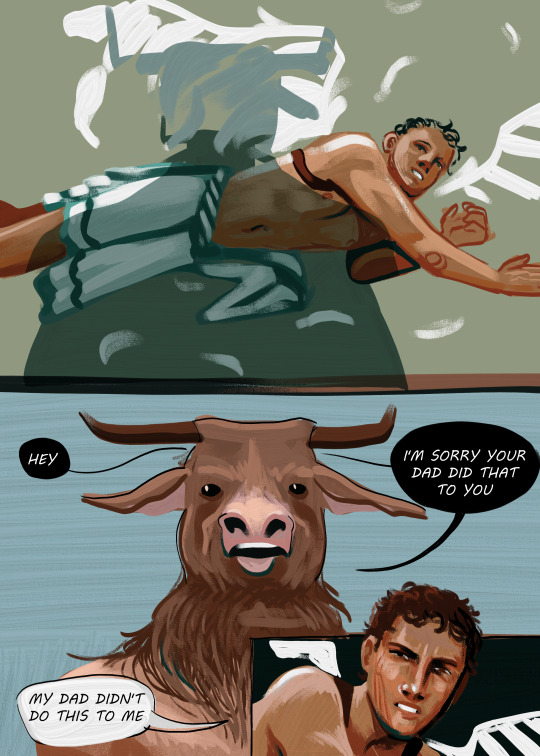
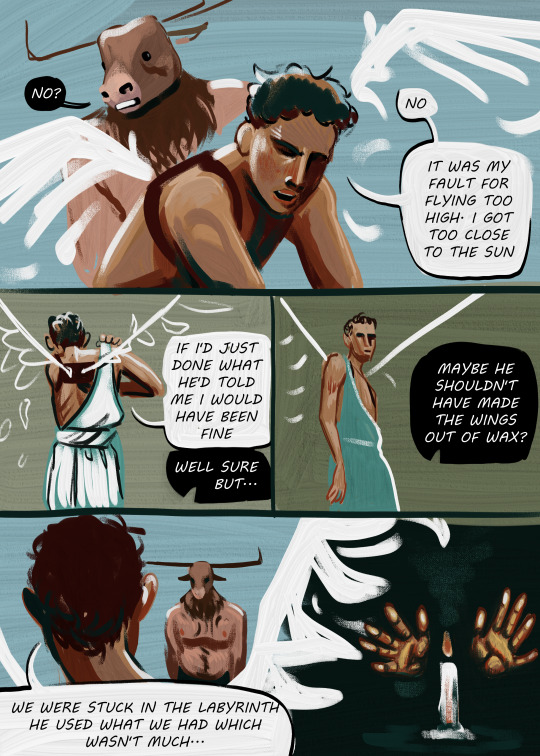

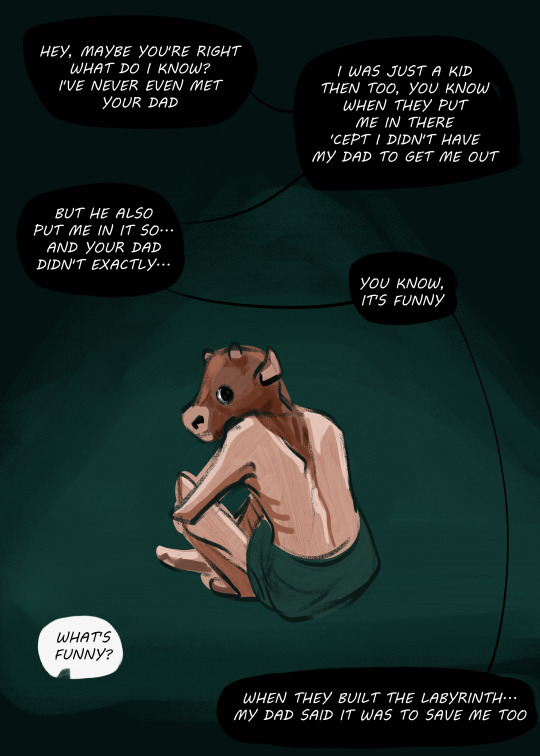

Sons Of The Labyrinth or The Things Our Fathers Do To Us
#tentatively unprivating to post this...might have to private again if the bots attack#death //#icarus#minotaur#daedalus#comics#greek mythology#pulled out my old classic greek myths book to go over the mythology for this and man...#daedalus was kind of a piece of work huh#art tag
59K notes
·
View notes
Text
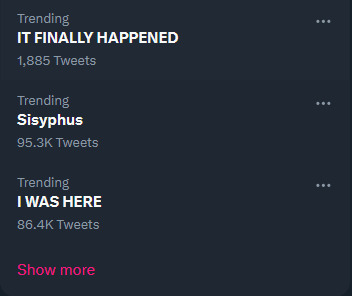
Big news from Tartarus I'm just so proud of him
71K notes
·
View notes
Text
one thing about orpheus and eurydice is you guys are all like “i’m different i wouldnt turn to look at her” because you are all familiar with the story of orpheus and eurydice. but orpheus wasnt familiar with the story because he was in it lol.
#anyway. its only really good bc its a tragedy. doomed by the narrative etc. he has to turn around theres no other end.#greek mythology#sorry. this ones in post jail now.
142K notes
·
View notes
Text
This new Interpretation of Medusa in the new episode of Percy jackson, as a survivor of abuse that directs her pain, because of missing justice, against people that she associates with her abusers, shows not only how much Rick Riordan has grown as a storyteller and interpreter of mythology but also how much we as a community have grown in interpreting and understanding the deeper meaning of mythological storys and the context they were made in.
#percy jackon and the olympians#percy jackson#percy jackson tv show#percy#medusa#greek mythology#mythology and folklore#percy jackson episode 3
23K notes
·
View notes